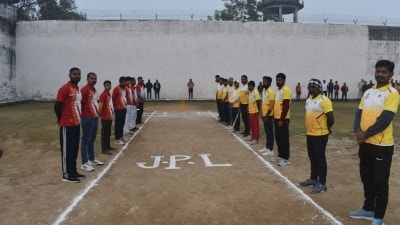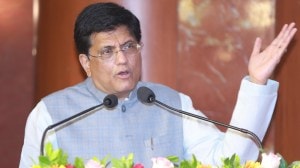Bridging the Gulf
It is the Middle East crisis that has forced the Minister for External Affairs Jaswant Singh to postpone his visit to Riyadh. The visit, w...

It is the Middle East crisis that has forced the Minister for External Affairs Jaswant Singh to postpone his visit to Riyadh. The visit, whenever it takes place, will be the first high-level bilateral political exchange between Saudi Arabia and India after a gap of nearly four years. It will give more substance to our relations with Saudi Arabia which is the largest and most influential country in the Gulf region. The relations became tenuous during the last two decades because of Saudi Arabia8217;s involvement in the Afghan conflict, with general support extended to Pakistan on the Kashmir issue and due to the destruction of the Babri mosque.
The uncertainties and distances were basically of a political and strategic nature. India8217;s establishing diplomatic relations with Israel also generated some reservations in the Saudi power structure. Nearly one half of the total of 1.5 to two million Indians working in the countries of the Gulf work in Saudi Arabia. It is one of the major suppliers of petroleum products to India. In the broader context of global and regional equations also, Saudi Arabia is and should be an important focus of attention in our foreign policy. It is one of the most influential countries of the Organisation of Islamic Countries OIC.
It would be relevant to take note of the overall foreign policy and strategic concerns of Saudi Arabia as they have evolved during the last two and a half decades. The foremost concern of the Saudi power structure is to sustain itself in power in the face of growing pressures of modernisation, democratisation and the political consciousness and aspirations of the people of the country. The overthrow of the Shah of Iran by Ayatollah Khomeini, revolution in Afghanisation backed by Soviet intervention in that country and the territorial and economic ambitions of Iraq in relation to the countries of the Gulf generated a range of threat perceptions in Saudi Arabia8217;s ruling elite. A security structure which the US had sought to put up on the twin pillars of its politico-strategic equations with Iran and Saudi Arabia crumbled with the revolution in Iran. This benefitted Saudi Arabia because the country became the focus of attention and cooperation for the US. Iraq8217;s invasion of Kuwait and the tensions with Iranresulted in Saudi Arabia being the fulcrum around which the US built its strategic and security arrangements in the region.
Given the volatile situation in Afghanistan, Tajikistan, Iraq and the difficulties being faced by the Middle East peace process, Saudi Arabia is becoming the most important military power in the region. The responsibility for the security of the Gulf region should primarily rest with the countries of the region. While permanent military presence of foreign powers should be avoided, foreign military assistance should be allowed when necessary for regional security in the Gulf. The countries of the Gulf should remain committed to the territorial integrity of the states of the region. Mutual assistance should be arranged between the countries of the region against subversion and arrangements for cooperation should be established in intelligence matters. The countries of the Gulf should ensure freedom of navigation as it is of vital interest to them. No extra regional power should be allowed to dominate the Gulf.
These elements of the Saudi security doctrine are undersigned by the US8217;s strategic position in the Gulf region which remains unchanged. President Carter initiated his doctrine on the subject in January 1980 when he stated: 8220;Let our US8217;s position be absolutely clear. Any attempt by an outside force to gain control of the Persian Gulf region will be recorded as an assault on the vital interests of the US and such an assault will be repelled by any means necessary, including military force. Finally, we are prepared to work with other countries in the region to share a cooperative framework that respects differing values and political beliefs, yet which enhances the independence, security and prosperity of all.8221;
President Reagan elaborated US policies further in May 1987 when he stated: 8220;The use of the vital sea lanes of the Persian Gulf will not be dictated by the Iranians. These lanes will not be allowed to come under the control of the Soviet Union, the Persian Gulf will remain open for navigation for nations of the world.8221; The reference to the Soviet Union in his statement was in the context of the massive Soviet military presence in Afghanistan. This approach of the US backed up the Saudi Arabian intentions of resisting the Soviet presence not only on strategic and political grounds but on religious grounds. The US and Saudi Arabia became operational supporters of the anti-Soviet campaign in Afghanistan. The Saudi intelligence agency and Saudi money were factors which sustained the resistance to the Soviet Union which ultimately resulted in the Soviet withdrawal from Afghanistan.
There is a substantive mutuality of economic interests in spheres of trade and in the energy sector. India as an important source of skilled manpower servicing the Saudi Arabian economy is of interest to Saudi Arabia. The foreign exchange remittances of Indians working in Saudi Arabia constitute an important segment of India8217;s foreign exchange earnings. Saudi Arabia8217;s commitment to ensure safety and freedom of navigation in the shipping lanes and trade routes is of vital interest to India. The OIC secretariat is located in Saudi Arabia and cooperative relationship with Saudi Arabia would help India establish linkages with the OIC countries to influence them to some extent to temper Pakistan8217;s adversarial attitude towards India.
One must acknowledge that the prospects of this will remain limited. On issues related to Jammu and Kashmir, the Saudi position has been ambiguous towards India and generally supportive of Pakistan. But given the shifts in the US policies since the Kargil conflict, Saudi Arabia would be marginally more receptive about our views on Jamp;K which Jaswant Singh will no doubt articulate during his visit. It is on cross-border terrorism, the role of the Taliban and other religious extremists in Jamp;K that India should undertake an in-depth discussion with Saudi Arabia. The chief of intelligence of Saudi Arabia has influence both in Pakistan and with the Taliban. India would like to discuss with the Saudi authorities its concerns about cross-border terrorism and related issues as mutual understanding and some cooperation between Saudi Arabia and India in this sphere is of special interest and importance to India. One recalls that some doubts and misunderstandings have resulted from Jaswant Singh8217;s visit to Israel thissummer. Needless to say, these need to be removed.
Saudi Arabia8217;s commitment to ensure safety and freedom of navigation in the shipping lanes and trade routes is of vital interest to India
- 01
- 02
- 03
- 04
- 05































